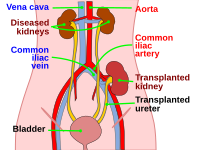
Photo from wikipedia
Background: Kidney Transplant is at its early childhood in Ethiopia, only 3 and half years since the first successful surgery. Surgical outcomes of the donors and recipient is an important… Click to show full abstract
Background: Kidney Transplant is at its early childhood in Ethiopia, only 3 and half years since the first successful surgery. Surgical outcomes of the donors and recipient is an important parameter to assess the center performance. Objective: determine socio-demographic characteristics, types of surgery, morbidity and types of complications in the first 100 living kidney donors and recipients in the national transplant center of Ethiopia. Methodology: A retrospective review and analysis of medical records of the first 100 living kidney donors and recipients was done. Descriptive statistics on socio-demographic and clinical characteristics of the donors and the patients was performed. Result: In the first four years 137 kidney transplants were performed, an average of 34 transplants a year. Males made 50.4(69) % of the donors. The mean age of donors was 33 years (ranged 18-66years). Siblings were the main donors 44%.Except the first 44 donor nephrectomies which were hand assisted laparoscopic donor nephrectomies (HALDN) the rest were open subcostal flank incision. HALDN was abandoned due to cost of consumables. All nephrectomies were left side. Except one patient who developed small bowel obstruction and needed laparotomy all donors were discharged with smooth postoperative course. Only one patient was readmitted for symptomatic retro-peritoneal hematoma which required drainage. Males made 71.5% (98) of the recipients. The age of patients ranged from 12 to 62 with a mean of 33.0. The cause of ESRD was unknown in most patients, 65.7%. The mean BMI of patients was 20kg/m2. The average time from out of ice to revascularization was 30.5 minutes. SSSI was the commonest postoperative complication seen in 6%. Three patients had early graft loss, while 2 patients had delayed graft function. Nearly 98% (134) of the patients were discharged with functioning graft. Conclusions: the outcomes of both the donor and the recipient is Excellent revealing transplant can be done and sustained successfuly in a developing nation.
Journal Title: Transplantation
Year Published: 2020
Link to full text (if available)
Share on Social Media: Sign Up to like & get
recommendations!